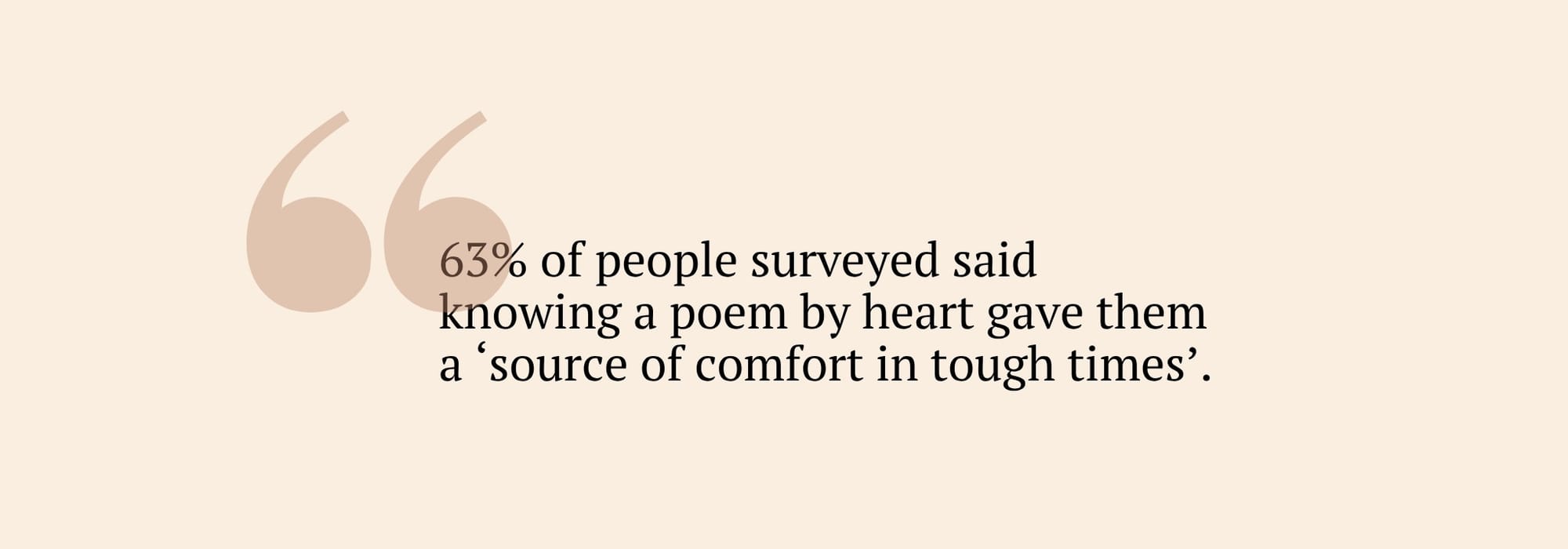Looking for a creative way to boost your brain? Memorising poetry has a whole host of mental health benefits…
My friend Bruce is 85 years old. Despite the decades between us, we have plenty in common – predominantly, a love of poetry. In fact, it’s down to Lewis Carroll’s ‘Jabberwocky’ – a poem we both memorised as children – that we are friends at all.
We met a while back at a festival campfire, where people were taking turns to perform songs and poems. When Bruce started reciting ‘Jabberwocky’, I leapt up and joined in.
We’ve been friends ever since. We’ve learned several more poems together, and now have a small repertoire that we enjoy speaking aloud.
This intergenerational friendship brings all kinds of benefits – Bruce and I are less likely to suffer from depression, according to 2020 research in the American Journal of Psychiatry, and are less likely to die from a range of chronic diseases, as noted in PLOS Medicine.
But it’s not just the friendship that’s doing us good – it’s the poetry.
A poetry prescription
Believe it or not, poetry is a well-documented therapeutic tool. A 2021 study, published in the International Journal of Psychology, looked at the benefits of 10 90-minute poetry therapy sessions on women with [post-traumatic stress disorder PTSD). The participants experienced a significant increase in psychological wellbeing, and a significant decrease in PTSD symptoms.
Another research project from 2016, in the Journal of Palliative Medicine, looked at the effects of music and poetry on pain relief. Both art forms were found to bring about a reduction in pain, and also a reduction in depression, for participants. However, only poetry resulted in an increased sense of hope. And, in today’s world, who doesn’t need that?
Perhaps the magic lies in the fact that reading poetry is not a passive act. It invites you into the poet’s world, and creates ‘thinking space’ in which we can reflect on our own lives through their words. The best poems don’t always make sense in a logical way, but they evoke an emotional reaction, and that can help us feel understood – forging a connection between poet and reader. In that way, a powerful poem can become a touchstone or friend. As poet Paul Celan wrote: “I cannot see any basic difference between a handshake and a poem.”
The Cambridge University’s Poetry and Memory Project shows us that memorising poems can strengthen that connection, where 63% of people surveyed said knowing a poem by heart gave them a “source of comfort in tough times”, and 44% reported that their memorised poems helped them make sense of life.

Why put a poem in your head?
If your experience of poetry is limited to your GCSE anthology, you might be wondering why anyone would purposely put a poem in their head for fun.
The great news is that the world of poetry is vast. It includes everything from five-line limericks to book-length epics of wild adventure, and poignant poems that will move you to tears. In fact, one of the reasons people turn to poetry is that it puts into words the emotions we struggle to express.
There are many reasons for learning poems by heart. Firstly, informal learning has been shown to contribute to our subjective wellbeing, and there is evidence, as shared in Ageing and Society, that learning can help protect against cognitive decline and dementia.
Practice and use of a new skill, alongside deliberately learning new information, strengthens the brain’s connections, and because learning and memory are intrinsically linked, every time we learn something new, we forge fresh neural pathways – AKA the brain equivalent of going to the gym.
But, there’s more to memorising poetry than mental push-ups. Participants in the Poetry and Memory project reported that poems had “become like personal friends”. Once a poem is in your head, you’ve made it portable: the project participants describe their memorised poems as an “internal anthology”, a “treasure chest”, and a “security blanket”. A memorised poem can be an emotional resource to reach for any time of day or night – it’s like carrying a mental health first aid kit.
Psychologist Martin Seligman suggests the key elements of psychological wellbeing are positive emotion, engagement, relationships, meaning, and accomplishment. The process of memorising poetry ticks all these boxes – starting with the positive experience of reading poetry, selecting a poem to learn, building a relationship with a poem, and finding meaning in it. Then there’s the sense of achievement that comes when you’ve learned, and (ideally) shared your poem with a friend.
In a world where we regularly outsource our memory to devices and hand over our thinking to AI, the discipline involved in learning a poem feels vital. It’s an ancient and deeply human practice, and one that is worth upholding.
How to start memorising poems
Poet Michael Rosen recommends choosing a poem you want to spend time with: “You’ve got to love the poem you want to learn.”
Poems with rhythm and rhyme or poems that tell a story are easier to remember, but whichever poems you choose, the trick is to make it fun. As former Poet Laureate Ted Hughes said: “There are many reasons for learning poems. But memorising them should be like a game. It should be a pleasure.”
Here are five effective strategies to try:
-
Record yourself reading the poem and listen on repeat.
-
Get creative. Pick out the main images from your poem and make a collage.
-
Take your poem for a walk. Repeat a line or two on your daily commute, or during an evening stroll.

-
Silly things are more memorable, so try acting your poem out. Exaggerated gestures and embodied readings of your poem will help forge those neural pathways.
-
Find an audience. Friendly listeners will celebrate your achievement, and give you a bonus hit of dopamine-induced joy.
Give yourself the gift of a poem
I’ll always be grateful that Bruce and I learned ‘Jabberwocky’ as young children. Otherwise, we might never have gone on from that festival campfire to sharing all the stories, experiences, laughter, and of course, wonderful poems that make our friendship so special.
It really does takes effort to learn a poem. More effort than sitting on the sofa and scrolling through social media. But, when you get to Bruce’s age and start to reflect on your life, I can guarantee that you’ll forget most of the memes and reels you’ve flicked through. You won’t forget a poem that you’ve learned by heart.


Comments